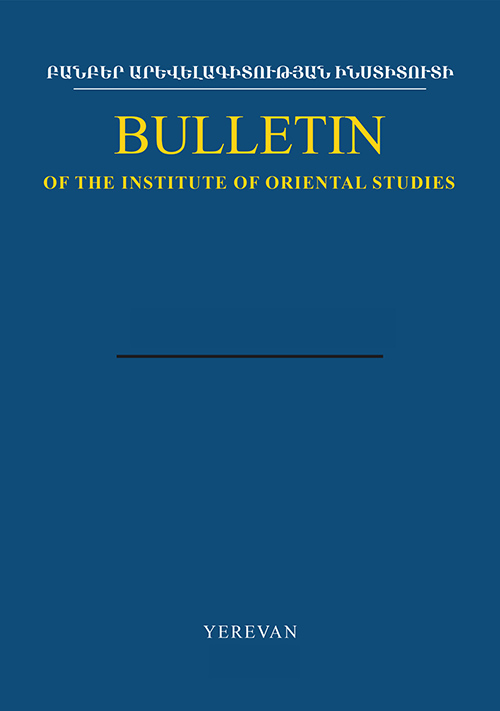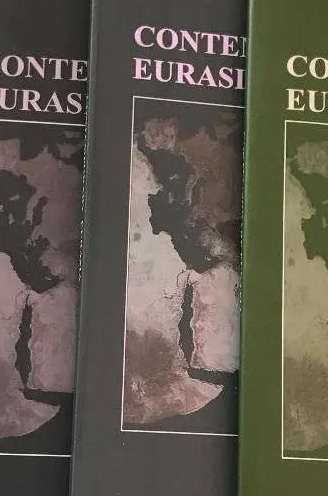
The main scientific directions of the Institute of Oriental Studies of NAS RA are:
- Eastern Sources of the Ancient, Medieval and New Period about Armenia and Armenians.
- Armenia and the Problems of Political, Social, Cultural and Ethnic History of Turkey, Iran, Caucasia and Arabic Countries of Mashriq.
- International relations in Near East, Eastern Asia, South Caucasus and the Republic of Armenia.
The Institute of Oriental Studies of NAS RA studies the history of countries and peoples of the Near and Middle East, the Caucasus, East Asia, socio-political, international and regional relations, culture, religion, problems of national minorities and ethnic groups, etc., from ancient times to the present day. Geographically, this choice is because the Near and Middle East and the Caucasus are the immediate neighbors of Armenia, the ancient and modern history of Armenia is closely linked to the history of indigenous and migrant peoples.
The Institute has departments of Ancient Orient, Christian Orient, Arab Countries, Turkey, Iran, International Relations, Eastern Sources and Historiography.
Considering the modern regional developments, new scientific sub-directions have been formed in the Institute in recent years, particularly in the direction of aimed at studying the modern history of India, Afghanistan and Israel.
The Institute of Oriental Studies of NAS RA actively participates in the implementation of scientific and applied activities, the main purpose of which is the formation of platforms of scientific and public diplomacy under the auspices of the Institute with the involvement of diplomatic and academic circles. Diplomatic representatives (ambassadors, other diplomats) from various Arab and Asian countries accredited in Armenia, RA diplomats who have served in Arab and Asian countries over the years, academic scholars, and members of various departments of the Republic of Armenia participated in these panels to jointly discuss current regional issues, their impact in the South Caucasus, particularly in terms of the security of Armenia and the Republic of Artsakh, prospects for the development of bilateral multi-sectoral relations between Arab countries and Armenia, issues of Armenian communities in a number of countries, possible prospects for scientific cooperation between Asian countries and Armenia, etc.
The researchers of the Institute actively participate in the discourse around Armenia's foreign policy by presenting the results of their research in expert interviews given to Armenian and foreign authoritative media which are broadcast both on the radio and on the Internet with the possibility of video recording.
The publication of school and university textbooks by the staff of the Institute is also one of the most important achievements of practical importance.
A valuable scientific achievement of the Institute is the periodical “Bulletin of the Institute of Oriental Studies”, which is published twice a year in English. The periodical has been published by the Institute of Oriental Studies of NAS RA since 1960 under the title “Countries and Peoples of the Near and Middle East”. In 2021 the journal was renamed “Bulletin of the Institute of Oriental Studies”. The institute also publishes the English-language journal “Contemporary Eurasia”. The Institute also publishes the collections “Oriental Sources”, “Eastern Asian Studies” and “Oriental Studies in Armenia”.
The Council of Young Orientalists at the Institute, which annually organizes an academic conference that brings together young people taking their first steps in Oriental studies, contributes greatly to encouraging young people. The proceedings of the conferences are published in the journal “Middle East. history, politics, culture” in a collection of articles.
The Institute has specialized councils of “World History” and “Eastern Source Studies” (Historiography, Source Studies), where the defense of candidate and doctoral dissertations is carried out.
The Institute has wide cooperation with many prestigious scientific and educational centers abroad, such as: Ivane Javakhishvili Institute of History and Ethnology (Georgia), Korneli Kekelidze Georgian National Centre of Manuscripts (Georgia), Institute of Far Eastern Studies of RAS (Russia), Primakov National Research Institute of World Economy and International Relations, Russian Academy of Sciences (Russia), The Russian Institute for Strategic Studies (Russia), Institute of Oriental Studies of RAS (Russia), Kuban State University (Russia), Pskov State University (Russia), Institute of History, Archaeology and Ethnography of the Dagestan Federal Research Center of the RAS (Russia), China Institute of International Studies, The Institute of East European, Russian and Central Asian Studies of the Chinese Academy of Social Sciences (China), China Academy of Contemporary International Relations (China), Panteion University of Social and Political Sciences (Greece), Democritus University of Thrace, Department of Language, Literature and Culture of the Black Sea Countries (Greece), Vivekananda International Foundation (India), French Institute of Arab Studies in Damascus (Syria), Department of History, Women’s Faculty of Ain Shams University (Egypt), The Egyptian Center for Strategic Studies (Egypt), Mukhtar Auezov South Kazakhstan University (Kazakhstan), Institute of History of the University of Rzeszów (Poland), Institute of History of the Mongolian Academy of Sciences (Mongolia), etc.
There is a regular exchange of specialists, literature and information between the Institute of Oriental Studies of NAS RA and foreign scientific centers, as well as lectures, trainings, thesis defenses, etc.
Researchers of the Institute actively participate in international conferences (Amsterdam, Leiden, Heidelberg, Frankfurt, Paris, London, New York, Berlin, Münster, Tehran, Beirut, Baghdad, Cairo, Berkeley, Los Angeles, Washington, etc.), including the International Congresses of Orientalists (Moscow, Paris, Ankara, Hamburg, Montreal, India, etc.).
The Institute has a specialized library of Oriental Studies, which contains more than 60 thousand units of literature: collections of documents, monographs, collections of articles, scientific periodicals, daily newspapers, etc., in Armenian, Russian, Georgian, Arabic, and Turkish, Ottoman, Persian, Hebrew, Kurdish, English, French, German, and other languages.
In recent years, books in the library have been digitized to provide electronic access to the public.
Scientists of the Institute of Oriental Studies have published many monographs, collections and scientific articles in these scientific fields. Most of them, apart from Armenian, have been published in Russian, Arabic, Farsi, Kurdish, English, German, French, Italian, Japanese and other languages: in Russia, Georgia, Iran, Poland, the United States, Germany, Austria, Hungary, France, Italy, Japan and other countries.


